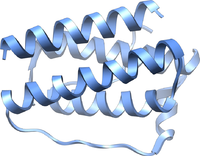
Photo from wikipedia
Metabolic Syndrome (MetS) increases the risk of developing type 2 diabetes mellitus and cardiovascular complications. The crosstalk between the hypothalamus and periphery is vital for regulating food intake and energy… Click to show full abstract
Metabolic Syndrome (MetS) increases the risk of developing type 2 diabetes mellitus and cardiovascular complications. The crosstalk between the hypothalamus and periphery is vital for regulating food intake and energy homeostasis. However, it is impaired during MetS. The present study aimed to compare the distinct central and peripheral metabolic derangements induced by a high-fructose drink or high-fat diet, as well as the possible intervention by fenofibrate. Rats were divided into five groups: standard chow diet (SCD) group, high-fructose group (FR), high-fat group (HF), FR plus fenofibrate group (FR-F), and HF plus fenofibrate (HF-F) group. FR and HF groups showed hyperglycemia, hyperinsulinemia, hypertriglyceridemia, hyperleptinemia, steatosis, and adipocyte hypertrophy. This was associated with elevated circulating levels of proinflammatory cytokines and free fatty acids (FFAs). The latter mediators seem to act as informers that are involved in hypothalamic inflammation and dysregulation of signaling cascades that control food intake and glucose homeostasis. The effects were more pronounced in the HF group, which were matched with the observed higher levels of plasma FFAs and cytokines. Fenofibrate administration improved not only the peripheral metabolic disturbances, but also the central disturbances associated with insulin resistance induced by FR or HF diet. This study sheds light on the pivotal role of the hypothalamus in diet-induced MetS. Furthermore, the study suggests the utmost importance of developing a standardized model of metabolic syndrome in place of the great diversity between available models, which can induce different effects and negatively impact the validity of prospective studies.
Journal Title: European journal of pharmacology
Year Published: 2020
Link to full text (if available)
Share on Social Media: Sign Up to like & get
recommendations!